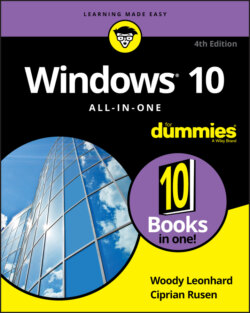Читать книгу Windows 10 All-in-One For Dummies - Ciprian Adrian Rusen, Woody Leonhard - Страница 18
Why Do PCs Have to Run Windows?
ОглавлениеHere’s the short answer: You don’t have to run Windows on your PC.
The PC you have is a dumb box. (You needed me to tell you that, eh?) To get that box to do anything worthwhile, you need a computer program that takes control of the PC and makes it do things. It does things such as show web pages on the screen, respond to mouse clicks or taps, or print résumés. An operating system controls the dumb box and makes it do worthwhile things, in ways that mere humans can understand.
Without an operating system, the computer can sit in a corner and display profound messages on the screen, such as Non-system disk or disk error or Insert system disk and press any key when ready. If you want your computer to do more than that, though, you need an operating system.
Windows is not the only operating system in town. The other big contenders in the PC and PC-like operating system game are Chrome OS, macOS, and Linux:
ChromeOS: Cheap Chromebooks have long dominated the best-seller lists at many computer retailers — and for good reason. If you want to surf the web, work on email, compose simple documents, or do anything in a browser — which covers a whole lot of ground these days — ChromeOS is all you need. Chromebooks run Google’s ChromeOS. They can’t run Windows programs such as Office or Photoshop (although they can run web-based versions of them, such as Office Online or the Photoshop Express Editor). Despite the limitations, they don’t get infected and have few maintenance problems. You can’t say the same about Windows 10: That’s why you need a thousand-page book to keep it going. Yes, you do need a reliable Internet connection to get the most out of ChromeOS. But some parts of ChromeOS and Google’s apps, including Gmail, can work even if you don’t have an active Internet connection.ChromeOS, built on Linux, looks and feels much like the Google Chrome web browser. There are a few minor differences, but in general, you feel like you’re working in the Chrome browser. One downside is that ChromeOS, unlike Linux or Windows, can’t be installed on any PC you want. It's limited to the devices on which it is sold and preinstalled by their manufacturer. That’s why, if you want ChromeOS, you must purchase a Chromebook or Chromebox (the “equivalent” of a desktop PC).For friends and family who don’t have big-time computer needs, I find myself recommending a Chromebook more often than not. It’s cheaper, easier for them, and easier for me to help them out.
macOS: Apple has made great strides running on Intel hardware. If you don’t already know how to use Windows or own a Windows computer, it makes sense to consider buying an Apple computer or running macOS or both. Yes, you can build a custom computer and run macOS on it: Check out
www.hackintosh.com. But, no, it isn’t legal — the macOS End User License Agreement explicitly forbids installation on a non-Apple-branded computer. Also, installing it is not for the faint of heart.That said, if you buy a Mac — say, a MacBook Air or Pro — it’s easy to run Windows 10 on it. Some people feel that the highest quality Windows environment today comes from running Windows 10 on a MacBook, and for years I’ve run it on my MacBook Pro and Air. All you need is a program called Boot Camp, and that’s already installed, free, on the MacBook.Linux: The big up-and-coming operating system, which has been up and coming for a couple of decades now, is Linux, which is pronounced “LIN-uchs.” It’s a viable contender for cheaper PCs and older ones. Linux comes in many names (called distros) and versions. If you want to give it a try, you might want to start with Ubuntu Linux. If you plan to use your PC only to get on the Internet — to surf the web and send emails— Linux can handle all that, with few of the headaches that remain as the hallmark of Windows. By using free programs such as LibreOffice (
www.libreoffice.org) and online services such as GSuite and Google Drive (www.drive.google.com), you can even cover the basics in word processing, spreadsheets, presentations, contact managers, calendars, and more. Linux may not support the vast array of hardware that Windows 10 offers — but more than a few wags will tell you that Windows has problems supporting it too.
